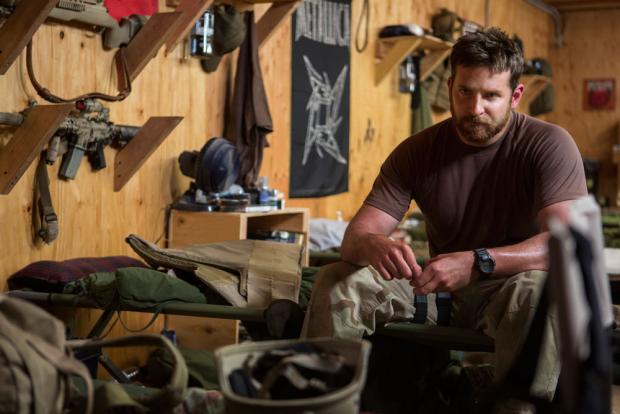Just Doing My Job: AMERICAN SNIPER
“Based on a true story.” How I’ve come to dread seeing those words at the start of a film, along with variations like “Based on true events.” (What’s the difference? You’d probably have to ask the studio lawyers who weigh in on such things.)
In the past few months, that phrase has opened Big Eyes, Foxcatcher, The Imitation Game, Selma, The Theory of Everything, Unbroken, and Wild. (That The Interview has the standard “This is all a work of fiction” disclaimer doesn’t let it off the hook.)
My objection to all this is purely professional: How can I critique a filmmaker’s vision of actual events without first acquiring an objective perspective of those events?
This, of course, takes the conscientious reviewer right down the rabbit hole. You can spend endless amounts of time researching a subject without getting to the entire “truth” of it. Yet even the most cursory investigation of the subjects of any of these films shows that the filmmakers have taken liberties. Of course drama usually requires some “shaping.” But the power of movies is such that a successful film based on a true story becomes the truth in the memories of the viewers. And that is an enormous responsibility.
Which brings us to American Sniper, the new film from Clint Eastwood. It is based on American Sniper: The Autobiography of the Most Lethal Sniper in U.S. Military History, the memoir of Chris Kyle, who as a Navy SEAL sniper in Iraq killed between 160 and 250 targets.
Working from a screenplay by Jason Hall (Paranoia), the film not surprisingly removes Kyle’s rough edges. A common comment from online readers of the book—even those who liked it—is that Kyle in his own words comes across as arrogant and indifferent to the Iraqis he dismisses as “savages.” There’s none of that in the movie. Bradley Cooper put on a lot of extra weight for the role, which takes away his usual feral angularity and renders him a reasonable facsimile of a stocky good ol’ boy from Texas. It would be going too far too call him teddy bear-ish, but not by much.
I have no objection to this, particularly given that the man died two years ago, shot to death by a veteran he was trying to counsel. You wouldn’t expect anything that disrespectful from Eastwood, though of course neither would you expect an attack on the military mentality, at least for a contemporary war. Truthfully, you can never know exactly what to expect from the director, who at 84 remains more in control of his craft as ever.
But having seen the film, I can’t imagine just what it is that Eastwood and Hall wanted viewers to take away from it. It takes no particular political stand on the invasion of Iraq, and if its viewpoint is limited to Kyle’s Manichean view that you’re either a good guy or a bad guy, it doesn’t particularly parade it.
The film is so bland that it even minimizes its subject’s claim to fame, the extraordinary number of people he shot after carefully sizing them up through the sights of a rifle. Either that affects a man or it doesn’t, and if it doesn’t you have to wonder why. But the film’s Kyle is more concerned with leading a squad to find an Iraqi torturer. His only regret is that he wasn’t able to save more American lives. The final reel of the movie finds him suffering from PTSD, but he gets over it with little apparent effort. Even the standard-issue complains of his wife (Sienna Miller)—“Even when you’re here, you’re not here”—are heard but not shown.
It’s my understanding that Kyle was involved with the early stages of production of the film prior to his death. That might explain some of American Sniper’s reticence, as an unwillingness to sully the image of a dead hero. But it doesn’t explain why a filmmaker so generally indifferent to popular opinion as Eastwood would take away just about everything else of interest about the character. So far from harming his memory, it gives you just about nothing to remember him for.

